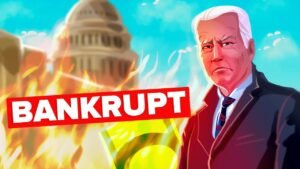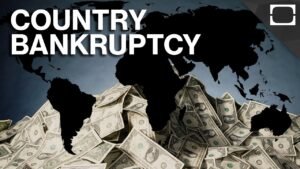What Happens If A Nation Declares Bankruptcy?
The recent collapse of Sri Lanka raises certain issues. Perhaps we should be aware that a country defaults on loans rather than declaring bankruptcy when it cannot pay its obligation. And one should keep in mind that “the government, not the country, is the defaulter.”

Ranil Wickremesinghe, the prime minister of Sri Lanka, declared the nation “bankrupt” on July 7 of this year.
If we quickly reflect on the past, we may recall that Sri Lanka’s economy started to decline in late 2020. The spreading Covid-19 epidemic was blamed at the time by the government. But, according to one observer, governmental ineptitude and growing loans to China were the main causes.
Time travel to May 19, 2022. As the nation battled its greatest financial crisis in more than 70 years, Sri Lanka made its first-ever default on debt. Its foreign exchange reserves have since become exhausted.
The price of everyday necessities, particularly food, is expected to surge on the market as a result of the reduction in foreign exchange reserves. The economy’s machinery is coming to a complete stop as a result of inefficiencies and power shortages. A severe humanitarian catastrophe has almost hit Sri Lanka as a result of the financial crisis.
According to experts, the fundamental reason for Sri Lanka’s dilemma is that more money was spent on needless huge projects, which in turn caused the country’s foreign debt to skyrocket. The recurring quantity of payments increases in proportion to the loan amount. To maintain public peace, taxes have once more been cut, and government revenue has also fallen.

Even though Sri Lanka only has $150 million in foreign exchange reserves, the lowest in its history, it will still be required to pay down roughly $6 billion in foreign debt by 2022. Sri Lanka will also be required to pay back an additional $2.5 billion in foreign debt between 2023 and 2026.
The epidemic has lasted for a while. The country’s primary source of income, the tourist sector, was severely impacted. At the beginning of the year, the Sri Lankan government gave the army the responsibility of making sure that citizens could purchase necessities like rice and sugar at fair prices. It made things worse. Food inflation topped 30% in March.
Since the epidemic started, more than 500,000 people in Sri Lanka have been living below the poverty line, according to the World Bank.
It is inaccurate to argue that a country is becoming bankrupt, according to India Times. A nation defaults on debts rather than declaring bankruptcy when it cannot pay its obligation. It’s also important to keep in mind that “the government, not the country,” is the defaulter.
One may think that a country’s government defaulting is exceptional based on the press coverage of the Sri Lankan catastrophe, however that is not totally accurate. Most countries have defaulted on or changed their agreements at some time in history.
Greece’s 2015 debt default, for which it owed the IMF $1.8 billion, was not the country’s first nor was it the first among wealthy nations. The nation experienced its first debt default in 377 BC. Throughout more than half of the nation’s history, beginning with the country’s independence in 1829, Athens’ administrations have defaulted on debts.
On the other side, Spain has Europe’s highest rate of loan default. Over the 18th and 19th centuries, the nation missed payments on its obligations 15 times.
IMF member nations frequently enter into bailout or assistance agreements with the organization to prevent debt defaults. Together with financial support, the IMF also contributes engineering expertise to oversee the bailout program.
The bailout funds are subject to limitations, though. The Washington Consent Agreement has a variety of requirements that the government that accepted the bailout is required to follow. Even if they are controversial, cost-cutting measures, currency devaluation, and trade liberalization are a few examples.

After taking out debt, the difficulty or inefficiency of using it forces the government into default. When a country’s government is replaced, the new administration almost always defaults on the debt incurred by the outgoing administration. Then they have to start down the road of a bailout arrangement.
For instance, government expenditures and a fall in tourism, the nation’s most important source of income, were cited as the reasons for Jamaica’s $7.9 billion debt default in 2010.
What Happens If A Nation Declares Bankruptcy?
Many factors can cause a nation to go into default. If the amount of global liquidity varies or tax collection is hampered for whatever reason, the government’s finances are put under pressure.
Lenders buy the assets of insolvent individuals or organizations. Yet, neither the assets of a nation nor the debts due to its government by foreign lenders may be bought.
It is important to keep in mind that things change if the government assets of the defaulting nation are situated abroad. A ship used for naval training in Ghana was seized in 2012 after Argentina went into debt.
Renegotiating the loan conditions is typically the only method to get the defaulting countries to pay the debt. to reschedule the delayed Treasury Securities payments, which will cause the bond’s price to decrease.
Argentina guaranteed its creditors a third of the debt after not repaying loans totaling $8.1 billion in 2011. 93% of their loans were converted into shares between 2005 and 2010, and until 2016, the Argentine government was unable to pay back 75% of the balance owed to the “Valcher Fund” (fund for buying bonds that had defaulted).
In a perfect world, governments would spend the revenue they get from taxes and investments to cover expenses and fulfill their obligations. The government can borrow in two distinct ways when we need to take on more debt than we can handle.
It raises funds from citizens by issuing bonds in return for a guarantee to pay interest at a specific rate for a predetermined period of time. The government can issue foreign currency bonds in order to raise money from overseas investors and get long-term loans from other countries. Sovereign debt is the name for the debt held by the government.
The government can control the debt by raising taxes, lowering interest rates, or producing new money if it is withheld. Loans inside the nation can be repaid in local currency. International loans, however, must be paid back in foreign money. As a result, the dollar must be taken out of the sector of investments that generate revenue, and if required, the loan must be paid back.
Also, see
Earthquake In Delhi NCR And Neighbouring Cities
Follow us on KooApp – here
